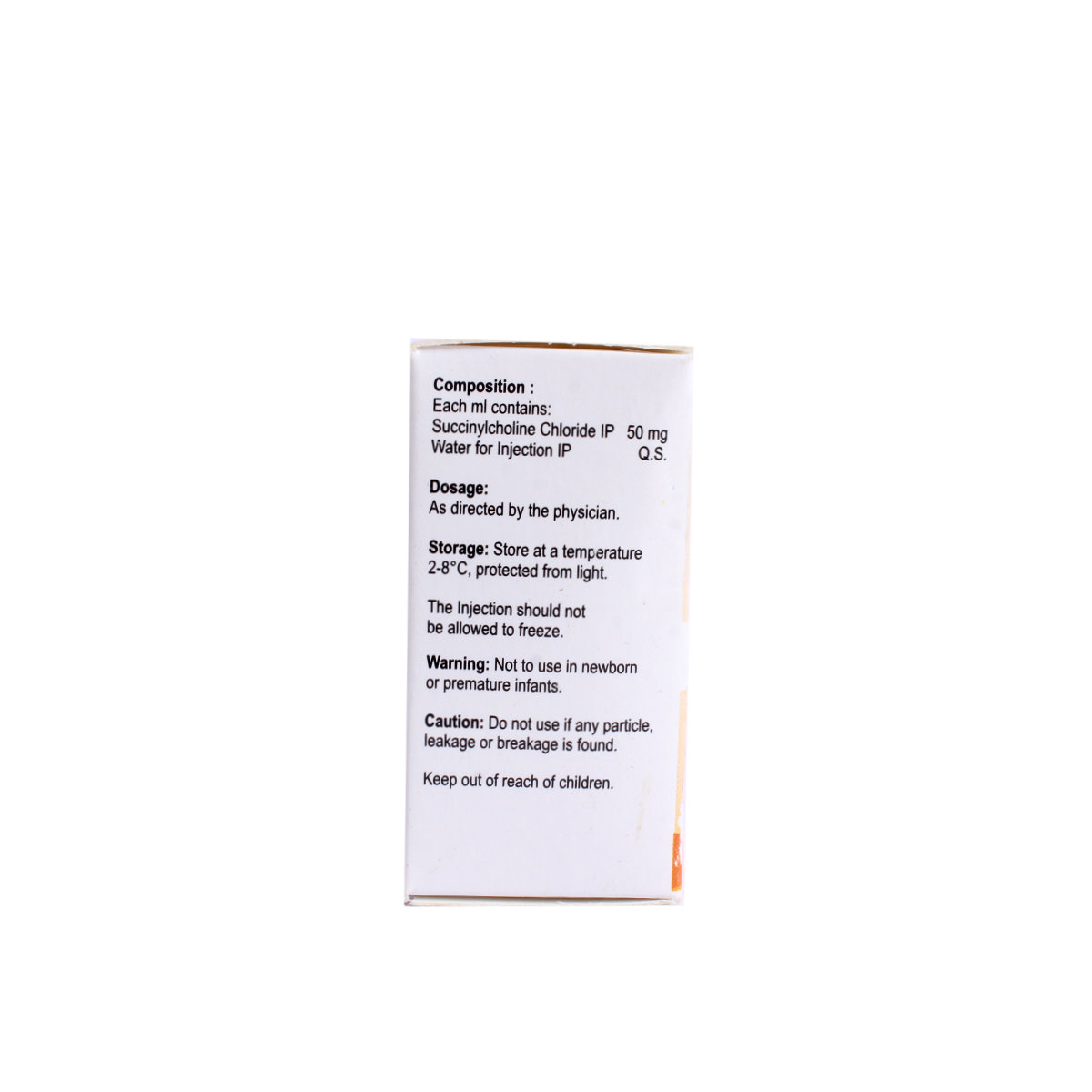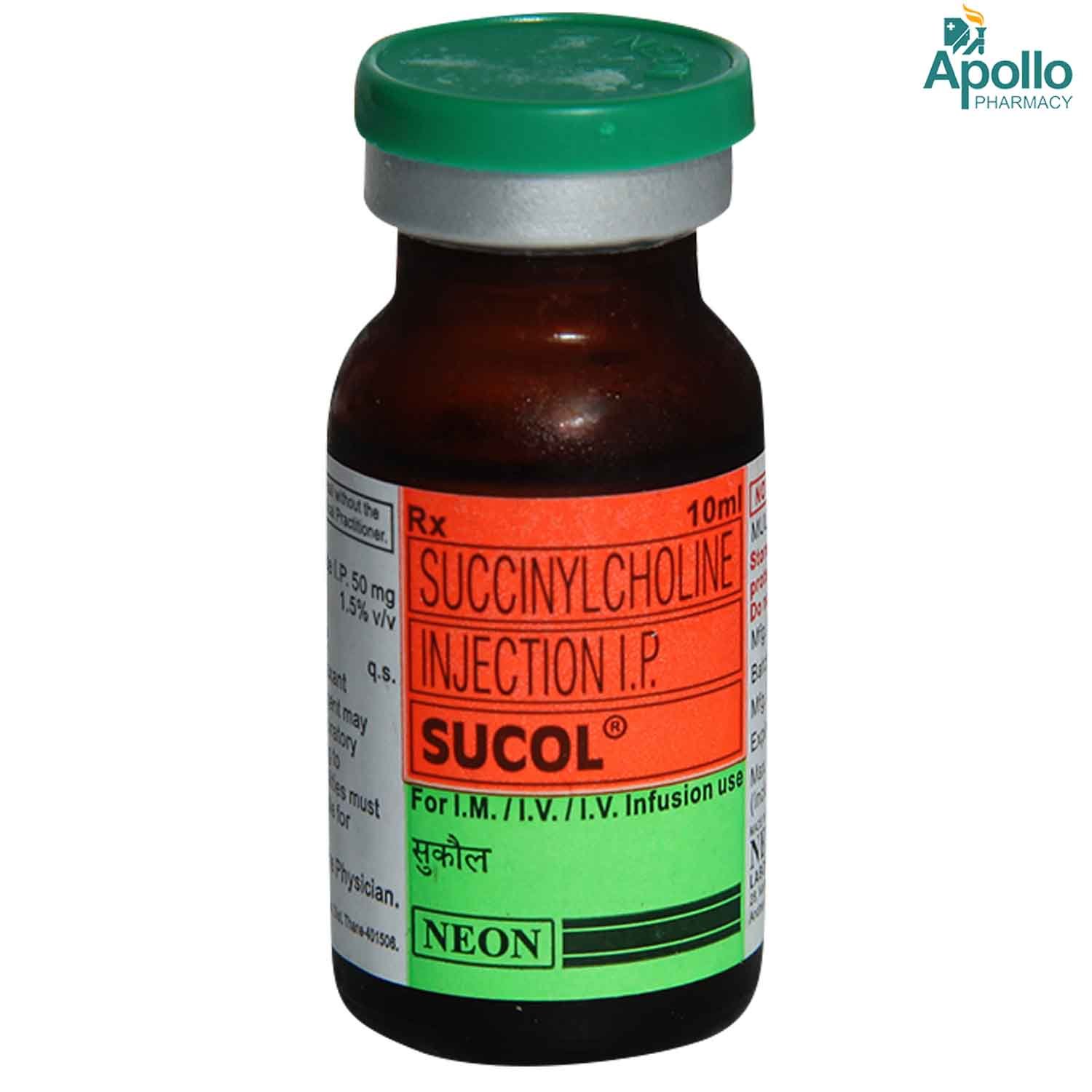Succithem Injection 10 ml




MRP ₹58
(Inclusive of all Taxes)
₹8.7 Cashback (15%)
Provide Delivery Location
Online payment accepted
 Prescription drug
Prescription drugWhats That
Synonym :
Composition :
Manufacturer/Marketer :
Consume Type :
Return Policy :
Expires on or after :
About Succithem Injection
Succithem Injection belongs to the class of medications called muscle relaxants. It is used in supporting general anaesthesia muscle relaxation during intubation. It also reduces the intensity of muscular contractions associated with pharmacologically or electrically induced convulsions.
Succithem Injection contains Succinylcholine Chloride. It relaxes the muscles by blocking the impulses from the nerves.
An experienced clinician or a trained healthcare professional will administer Succithem Injection. Increased intragastric pressure, rash, muscle fasciculation, post-operative muscle pains, myoglobinaemia (acute injury to muscle tissue), transient blood potassium increase, muscle fasciculation (muscle twitch), post-operative muscle pains, intragastric pressure, myoglobinuria (an excess amount of myoglobin in the urine), flushing, bradycardia, tachycardia, increased intraocular pressure, anaphylactic reactions (a severe allergic reaction) are undesirable consequences during your procedure, just like other general anaesthetics, since your anaesthetist will immediately address any issues that emerge during your procedure.
Before taking the Succithem Injection, let your doctor know about all your medical conditions, sensitivities, and medications you are using. Also, inform your doctor if you are pregnant, planning to become pregnant, or breastfeeding.
Uses of Succithem Injection
Directions for Use
Medicinal Benefits
Succithem Injection containes Succinylcholine Chloride, which belongs to the class of drugs known as muscle relaxants. Muscle relaxants are used as part of general anaesthesia during an operation. When undergoing surgery, your muscles must be entirely relaxed. This makes surgery easier for the surgeon. If you are under anaesthesia, Succithem Injection may be used to facilitate the placement of a tube into your trachea (windpipe) for artificial ventilation (mechanical help of breathing). It is also used to reduce the intensity of muscular contractions associated with pharmacologically or electrically induced convulsions.
Storage
Drug Warnings
Succithem Injection should be used with caution in patients who are allergic to muscle relaxants, have had allergies, cardiovascular disease, asthma, pulmonary impairment, burns, hyperkalemia, malignant hyperthermia, skeletal muscle myopathies, and upper motor neuron injury. So, before taking the Succithem Injection, inform your doctor about all of your medical issues, sensitivities, and drugs you are using. Also, let your doctor know if you are pregnant or breastfeeding. Although, the heart muscle is not directly affected by succinylcholine. However, vagal stimulation during surgery or elevated potassium in the blood, particularly in pediatric patients, can also cause changes in heart rate, including cardiac arrest, as Succithem Injection stimulates both autonomic ganglia and muscarinic receptors. Additionally, intraocular pressure rises right after Succithem Injection.
Drug-Drug Interactions
Drug-Drug Interactions
Login/Sign Up
Using Succithem Injection 10 ml together with Colistin may increase the effects of Succithem Injection 10 ml.
How to manage the interaction:
Although there is a possible interaction between Colistin and Succithem Injection 10 ml, you can take these medicines together if prescribed by your doctor. However, if you experience an upset stomach, Rash Paresthesia (tingling or pricking sensation) Dizziness Slurred speech Vertigo, or Fever, consult a doctor. Do not stop using any medications without a doctor's advice.
Co-administration of amikacin with Succithem Injection 10 ml enhances the effects of atracurium leading to the risk of breathing problems.
How to manage the interaction:
Although there is a possible interaction between Succithem Injection 10 ml and Amikacin, you can take these medicines together if prescribed by a doctor. Consult a doctor if you experience shortness of breath, chest discomfort, palpitation, or dizziness, Do not stop using any medications without a doctor's advice.
Co-administration of Polymyxin b may increase the effects of Succithem Injection 10 ml when taken in combination.
How to manage the interaction:
Co-administration of Succithem Injection 10 ml with Polymyxin b can result in an interaction, but it can be taken if a doctor has advised it. Do not stop using any medications without a doctor's advice.
Taking tobramycin with succinylcholine can increase the risk of respiratory depression(hypoventilation).
How to manage the interaction:
There may be a possibility of interaction between Succithem Injection 10 ml and Tobramycin, but it can be taken if prescribed by a doctor. Do not discontinue any medications without first consulting your doctor.
Drug-Food Interactions
Drug-Food Interactions
Login/Sign Up
Side Effects of Succithem Injection
- Increased intragastric pressure
- Rash
- Muscle fasciculation
- Post-operative muscle pains
- Myoglobinaemia (acute injury to muscle tissue)
- Transient blood potassium increase
- Muscle fasciculation (muscle twitch)
- Post-operative muscle pains
- Intragastric pressure
- Myoglobinuria (an excess amount of myoglobin in the urine)
- Flushing
- Bradycardia
- Tachycardia
- Increased intraocular pressure
- Anaphylactic reactions (a severe allergic reaction)
Habit Forming
Therapeutic Class
Succithem Injection Substitute

Product Substitutes
Author Details
We provide you with authentic, trustworthy and relevant information
Drug-Diseases Interactions
Drug-Diseases Interactions
Login/Sign Up
FAQs
Succithem Injection contains Succinylcholine Chloride. It relaxes the muscles by blocking the impulses from the nerves. Thus, it is easy to aid surgical procedures and ventilation of the lungs in elective and critical situations.
Succithem Injection may affect your heart rate. Fluctuations of the heart rate are common. Your anaesthetist will quickly deal with any problems that arise during your operation.
You should not receive Succithem Injection if you are allergic to Succinylcholine Chloride or any of the other ingredients of this medicine.
Disease/Condition Glossary
General anaesthesia: General anaesthesia is a controlled condition of unconsciousness. During general anaesthesia, medications are used to put you to sleep so that you are unaware of the procedure and do not move or experience discomfort. A general anaesthetic is used for surgical operations if it is safer or more pleasant for you to be asleep.
Muscle relaxant: A muscle relaxant is a medication that affects skeletal muscle function and tone. It can help with symptoms like muscle spasms, discomfort, and hyperreflexia. It can also be utilized in Intensive Care Units to relax muscles for certain medical procedures.

Have a query?
Buy best C.n.s Drugs products by
Intas Pharmaceuticals Ltd
Sun Pharmaceutical Industries Ltd
Torrent Pharmaceuticals Ltd
Alkem Laboratories Ltd
Abbott India Ltd
Cipla Ltd
Alteus Biogenics Pvt Ltd
Micro Labs Ltd
Lupin Ltd
Ipca Laboratories Ltd
D D Pharmaceuticals Pvt Ltd
Icon Life Sciences
Mankind Pharma Pvt Ltd
Tripada Healthcare Pvt Ltd
Arinna Lifesciences Ltd
Linux Laboratories Pvt Ltd
East West Pharma India Pvt Ltd
La Renon Healthcare Pvt Ltd
Talent India Pvt Ltd
Tas Med India Pvt Ltd
Zydus Healthcare Ltd
Cnx Health Care Pvt Ltd
Eris Life Sciences Ltd
Leeford Healthcare Ltd
Emcure Pharmaceuticals Ltd
Macleods Pharmaceuticals Ltd
Sigmund Promedica
Aristo Pharmaceuticals Pvt Ltd
Dr Reddy's Laboratories Ltd
Troikaa Pharmaceuticals Ltd
Consern Pharma Ltd
Zydus Cadila
Shine Pharmaceuticals Ltd
Wockhardt Ltd
Ardent Life Sciences Pvt Ltd
Crescent Formulations Pvt Ltd
Theo Pharma Pvt Ltd
Reliance Formulation Pvt Ltd
Ikon Pharmaceuticals Pvt Ltd
Propel Healthcare
Neon Laboratories Ltd
Jagsam Pharma
Msn Laboratories Pvt Ltd
Morepen Laboratories Ltd
Pulse Pharmaceuticals
Sanofi India Ltd
Med Manor Organics Pvt Ltd
Hetero Healthcare Pvt Ltd
Novartis India Ltd
Crescent Therapeutics Ltd
Elder Pharmaceuticals Ltd
Solvate Laboratories Pvt Ltd
Akumentis Healthcare Ltd
Mova Pharmaceutical Pvt Ltd
Psyco Remedies Ltd
Tripada Lifecare Pvt Ltd
Ajanta Pharma Ltd
Cyrus Remedies Pvt Ltd
Medishri Healthcare Pvt Ltd
Cadila Healthcare Ltd
Glenmark Pharmaceuticals Ltd
Matteo Health Care Pvt Ltd
Hbc Life Sciences Pvt Ltd
Lyf Healthcare
Matias Healthcare Pvt Ltd
Mesmer Pharmaceuticals
Alembic Pharmaceuticals Ltd
Capital Pharma
Crescent Pharmaceuticals
Medopharm Pvt Ltd
Alniche Life Sciences Pvt Ltd
Kivi Labs Ltd
Talin Remedies Pvt Ltd
USV Pvt Ltd
Quince Lifesciences Pvt Ltd
Solis Pharmaceuticals
Infivis Life Care
Zuventus Healthcare Ltd
Cadila Pharmaceuticals Ltd
Pfizer Ltd
Wallace Pharmaceuticals Pvt Ltd
A N Pharmacia Laboratories Pvt Ltd
Blue Cross Laboratories Pvt Ltd
Jenburkt Pharmaceuticals Ltd
Lia Life Sciences Pvt Ltd
Mano Pharma
Medley Pharmaceuticals Ltd
Primus Remedies Pvt Ltd
FDC Ltd
Maneesh Pharmaceuticals Ltd
Apex Laboratories Pvt Ltd
Gagnant Healthcare Pvt Ltd
Ozone Pharmaceuticals Ltd
RPG Life Sciences Ltd
Strides Shasun Ltd
Unichem International
GlaxoSmithKline Pharmaceuticals Ltd
Kuresys Labs Pvt Ltd
LA Pharma
Trion Pharma India Llp
Alcohol
Unsafe
Consumption of alcohol is not recommended.
Pregnancy
Caution
Succithem Injection should be used in pregnant women only if clinically needed, and the benefits outweigh the risks. So, inform your doctor before receiving the Succithem Injection if you are pregnant or planning for pregnancy. Your doctor will prescribe only if the benefits outweigh the risks.
Breast Feeding
Caution
It is not known whether Succithem Injection passes into breastmilk. Avoid breastfeeding for a certain period after receiving Succithem Injection as per the doctor's instructions.
Driving
Unsafe
Patients should not drive or operate heavy machinery for a certain period of time. When Succinylcholine Chloride is administered as part of a general anaesthetic, you may feel tired, weak, or dizzy for a short period of time. Your anesthesiologist can tell you how long the effects will remain.
Liver
Caution
Caution should be exercised while using Succithem Injection in patients with liver impairment. So, inform your doctor before receiving the Succithem Injection if you have a liver impairment/disorder history. Your doctor will prescribe only if the benefits outweigh the risks.
Kidney
Caution
Caution should be exercised while using Succithem Injection in patients with Kidney impairment. So, inform your doctor before receiving the Succithem Injection if you have a Kidney impairment/disorder history. Your doctor will prescribe only if the benefits outweigh the risks.
Children
Caution
Please consult your doctor. Your child's doctor will prescribe this medicine if the benefits outweigh the risks.








